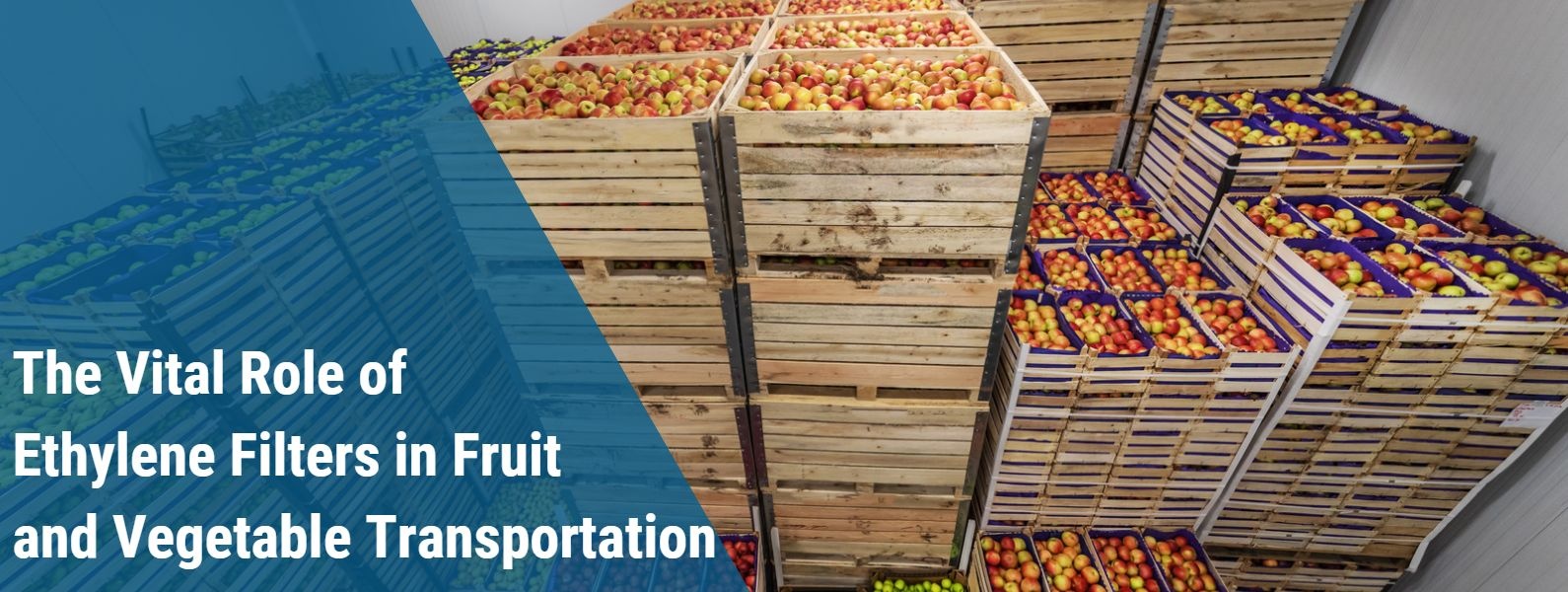Enhancing Freshness: The Vital Role of Ethylene Filters in Fruit and Vegetable Transportation
- Posted on
- By Praxas
- 0

Transporting fruits and vegetables from farm to table is a complex process that demands utmost care to ensure freshness and quality. One crucial factor that often goes unnoticed is the impact of ethylene, a natural plant hormone that influences the ripening and deterioration of produce. To combat the negative effects of ethylene, the use of ethylene filters has emerged as a game-changer in the industry. In this article, we delve into the importance of employing ethylene filters during the transportation of fruits and vegetables, and how they contribute to preserving freshness and extending shelf life.
Understanding the Menace of Ethylene
Ethylene, though a natural hormone, poses a significant threat to the longevity of fresh produce. As fruits and vegetables respire, they release ethylene gas, which can speed up the ripening process, leading to premature spoilage. The result? Reduced shelf life, increased wastage, and dissatisfied consumers. Here's where ethylene filters step in.
Extending Shelf Life with Ethylene Filters
Ethylene filters act as a safeguard against the detrimental effects of ethylene gas. These filters are strategically placed within transportation containers, such as crates or pallets, where they absorb ethylene and prevent it from reaching other produce items. By reducing ethylene concentrations, these filters effectively slow down the ripening process and preserve the freshness and quality of fruits and vegetables.
Maintaining Optimal Quality and Appearance
Ethylene can wreak havoc on the visual appeal of fruits and vegetables. It accelerates colour changes, causes over-softening, and impairs the flavour profile of the produce. However, by integrating ethylene filters into the transportation process, the negative impact of ethylene is minimised. The filters create a controlled environment that helps maintain the vibrant colours, firm textures, and natural flavours that consumers desire.
Minimising Cross-Contamination
Ethylene is a gaseous compound that can travel through the air, making it easy for ethylene-sensitive produce to be affected by ethylene-producing items. By utilising ethylene filters, the risk of cross-contamination is significantly reduced. This enables transportation companies to confidently transport ethylene-sensitive fruits and vegetables alongside ethylene-producing ones without compromising quality.
Sustainable Solution for Reducing Food Waste
The implementation of ethylene filters not only enhances product quality but also contributes to sustainable practices in the food industry. By extending the shelf life of fruits and vegetables, these filters help minimise food waste. Reduced spoilage rates translate into lower financial losses for businesses, reduced environmental impact, and a more efficient supply chain overall.
Other Environmental Factors and Processes Affecting Quality
Transporting fruit and vegetables involves more than just controlling ethylene levels. Several other environmental factors play a crucial role in maintaining the quality and freshness of produce during shipment. Here are some key considerations:
Temperature Control
Temperature control is paramount in preserving the quality of fruits and vegetables during transportation. Different produce items have specific temperature requirements to slow down respiration rates and inhibit microbial growth. Refrigeration or controlled atmosphere storage systems help maintain optimal temperature and humidity levels, preventing premature ripening and decay.
Humidity Control
Humidity control is crucial in preserving the quality and texture of fruits and vegetables. High humidity levels can promote the growth of mould and bacteria, while low humidity can cause wilting and dehydration. Maintaining appropriate humidity levels within transportation containers or utilising humidity control systems helps prevent moisture-related issues and ensures the freshness of the produce.
Using temperature data loggers or temperature/humidity data loggers to keep accurate environmental records throughout transportation can help to provide proof of correct handling in the transportation process or to diagnose any problems within your processes to inform steps towards continuous improvement.
Using moisture absorbing desiccants can help to maintain optimum humidity levels.
Air Circulation
Proper air circulation within transport containers is vital to prevent the buildup of heat, moisture, and carbon dioxide. Insufficient air movement can lead to the accumulation of ethylene gas and create an environment conducive to microbial growth. Ensuring adequate ventilation helps maintain freshness and minimises the risk of spoilage.
Packaging and Cushioning
Packaging plays a crucial role in protecting fruits and vegetables during transit. Sturdy, well-designed packaging helps prevent physical damage and bruising, which can hasten spoilage. Additionally, cushioning materials, such as foam or padding, provide an extra layer of protection and minimize the impact of vibration or jostling during transport.
Light Exposure
Exposure to light, especially direct sunlight, can have detrimental effects on certain fruits and vegetables. Light exposure can accelerate the breakdown of pigments, leading to colour fading or discoloration. Packaging materials should be chosen carefully to shield produce from excessive light exposure, preserving their visual appeal and nutritional content.
Ethylene Separation
While ethylene filters are effective in managing ethylene gas, it's also crucial to separate ethylene-producing and ethylene-sensitive produce. This segregation minimizes the risk of ethylene exposure to sensitive items, preventing premature ripening and quality degradation.
Handling and Loading Practices
Proper handling and loading practices are essential to avoid physical damage and reduce stress on fruits and vegetables during transportation. Gentle handling, appropriate stacking techniques, and secure fastening mechanisms help minimise bruising, crushing, and mechanical injuries that can compromise the quality and shelf life of the produce.
By carefully managing these environmental and process factors, transportation companies can ensure that fruits and vegetables arrive at their destination in optimal condition, with extended shelf life, vibrant appearance, and excellent flavour.
Optimise Fresh Fruit and Vegetable Shipping Processes with Praxas
As the demand for fresh produce continues to rise, it becomes crucial to prioritise methods that preserve quality and extend shelf life during transportation. Ethylene filters provide a practical and sustainable solution to combat the negative effects of ethylene gas. By implementing these filters, transportation companies can ensure that fruits and vegetables reach their destination with enhanced freshness, vibrant colours, and optimal taste. Incorporating the use of ethylene filters into your shipment process is a vital step towards reducing food waste, meeting consumer expectations, and maintaining a thriving produce industry.
Praxas specialise in products and services designed to protect your shipments. For expert advice, speak to a member of our team today, or shop online now for Praxas data logging, air treatment, and shipment protection products.
For PDF click here


Comments
Be the first to comment...